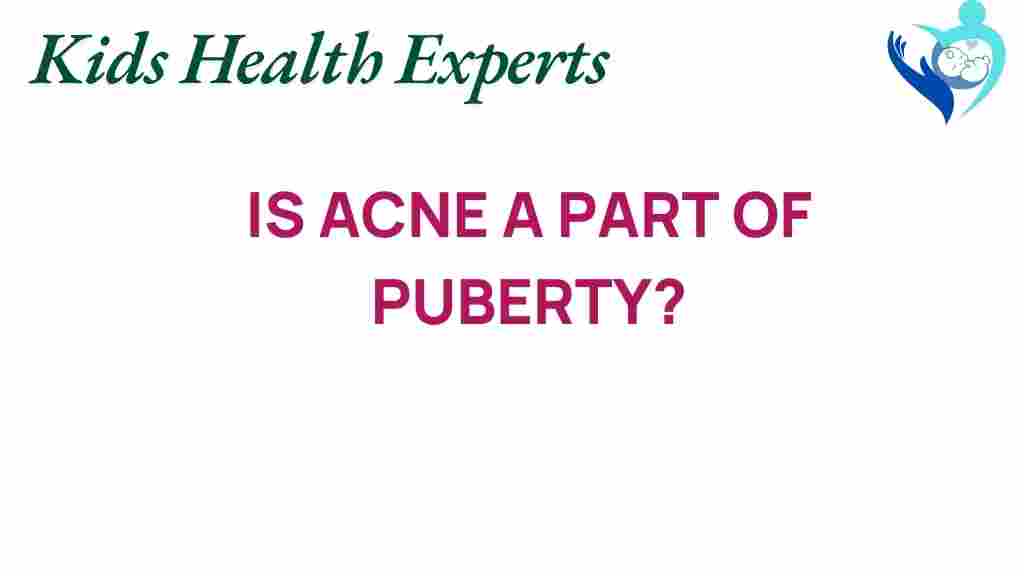Unraveling the Acne Puzzle: Is It Just Puberty’s Curse?
Acne is a common skin condition that many experience during their teenage years, often attributed to the hormonal changes that occur during puberty. While it’s easy to dismiss acne as just a phase of adolescence, understanding its complexities and causes can empower individuals to take control of their skin health. In this article, we will explore the multifaceted nature of acne, its relationship with puberty, and effective treatment options available to improve skin health and self-esteem.
Understanding Acne and Its Causes
Acne is characterized by the presence of pimples, blackheads, and cysts on the skin, primarily affecting the face, back, and shoulders. It occurs when hair follicles become clogged with oil and dead skin cells. Several factors contribute to this condition, including:
- Hormonal Changes: During puberty, the body undergoes significant hormonal fluctuations, particularly an increase in androgens. These hormones stimulate the sebaceous (oil) glands, leading to excess oil production.
- Genetics: Family history can play a crucial role in determining an individual’s susceptibility to acne.
- Diet: Certain foods, particularly those high in sugar and dairy, may exacerbate acne in some individuals.
- Stress: Increased stress levels can trigger hormonal changes that worsen acne.
- Skincare Products: Some cosmetic products can clog pores and lead to breakouts.
The Impact of Puberty on Skin Health
Puberty is a time of rapid physical and emotional changes. In terms of skin health, the increase in androgens leads to several changes:
- Increased Oil Production: The skin becomes oilier, increasing the likelihood of clogged pores.
- Changes in Skin Texture: Skin may become thicker and more prone to scarring.
- Emotional Factors: The teenage years are also marked by heightened emotions, which can affect self-esteem.
Understanding these changes can help adolescents and their caregivers respond effectively to skin issues, fostering better self-esteem and confidence during these formative years.
Common Conditions Associated with Acne
While acne is the most recognized condition during puberty, it can also manifest in various forms, including:
- Acne Vulgaris: The most common form, characterized by blackheads, whiteheads, and inflamed lesions.
- Cystic Acne: A severe form of acne that results in painful, deep cysts under the skin.
- Hormonal Acne: Often seen in teenage girls, this type is linked to hormonal fluctuations related to menstruation.
Each type of acne may require a different approach in treatment, emphasizing the importance of a tailored skincare regimen.
Skincare Tips for Managing Acne
Maintaining a proper skincare routine is essential for managing acne. Here are some effective tips:
- Cleanse Regularly: Use a gentle cleanser twice a day to remove excess oil and dirt.
- Avoid Over-Washing: Over-cleansing can irritate the skin and worsen acne.
- Use Non-Comedogenic Products: Choose skincare and makeup products labeled “non-comedogenic” to prevent clogged pores.
- Moisturize: Even oily skin needs hydration. Use an oil-free moisturizer to keep the skin balanced.
- Sun Protection: Use sunscreen to protect the skin from UV damage, which can worsen acne scars.
Treatment Options for Acne
There are various treatment options available for acne, ranging from over-the-counter products to prescription medications. Here’s a breakdown:
Over-the-Counter Treatments
Many effective products can be purchased without a prescription, including:
- Benzoyl Peroxide: Helps kill acne-causing bacteria and reduces inflammation.
- Salicylic Acid: Aids in exfoliating dead skin cells and unclogging pores.
- Alpha Hydroxy Acids (AHAs): Promote skin renewal and can improve the appearance of acne scars.
Prescription Medications
If over-the-counter treatments do not yield results, a dermatologist may prescribe:
- Topical Retinoids: Help prevent clogged pores and encourage skin turnover.
- Antibiotics: Reduce bacteria on the skin and inflammation.
- Hormonal Treatments: For teenage girls, hormonal therapies can regulate hormone levels and reduce acne.
- Isotretinoin: A powerful oral medication for severe acne cases, but with potential side effects that require careful monitoring.
It’s essential to consult a healthcare professional before starting any treatment to ensure it’s appropriate for your specific skin type and condition.
Troubleshooting Common Skincare Issues
Despite best efforts, some individuals may still experience persistent acne. Here are some troubleshooting tips:
- Review Your Skincare Products: Ensure all products are suitable for acne-prone skin and avoid those that can clog pores.
- Evaluate Your Diet: Consider reducing sugar and dairy intake, as these may exacerbate acne for some people.
- Manage Stress Levels: Incorporate stress-reducing activities such as yoga, meditation, or exercise into your routine.
- Stay Hydrated: Drinking plenty of water can help maintain skin health.
- Don’t Pick or Squeeze: This can lead to scarring and further inflammation.
Boosting Self-Esteem During the Teenage Years
The teenage years can be challenging, especially with the added pressure of skin health and appearance. Here are some ways to boost self-esteem:
- Focus on Overall Health: Prioritize a balanced diet, regular exercise, and adequate sleep.
- Practice Positive Self-Talk: Encourage a positive mindset by recognizing that acne is a common issue and does not define one’s worth.
- Seek Support: Talk to friends, family, or a counselor about feelings related to self-esteem and body image.
- Consider Joining Support Groups: Connecting with peers facing similar struggles can foster a sense of community and understanding.
Conclusion
Acne during puberty is a common condition that many face, but it’s essential to recognize that it’s not just a curse of adolescence. Understanding the causes, embracing effective skincare practices, and exploring treatment options can significantly improve skin health and self-esteem. Remember, the teenage years are a time of change and growth, and taking proactive steps to manage acne can empower individuals to navigate this phase with confidence. For more in-depth information on skincare and acne treatment options, check out resources from the American Academy of Dermatology.
Should you experience persistent issues with acne, consider consulting a dermatologist to tailor a treatment plan that best suits your skin’s needs. Everyone deserves to feel confident in their skin!
This article is in the category Conditions and created by KidsHealthExperts Team
